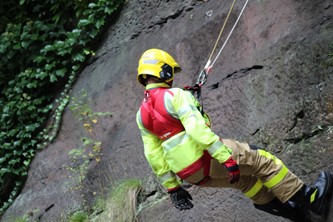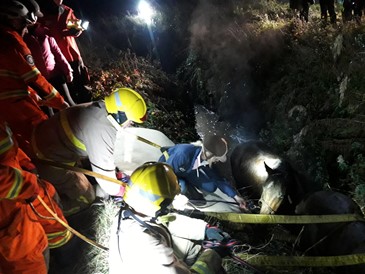
Rescue From Height
Every firefighter is trained to work safely at height with ropes and every rescue appliance carries a well equipped rope access kit. In addition, we can immediately deploy the Search and Rescue Team who are highly skilled with rope access and rescue equipment to perform more complex rescues across Merseyside at any time. These incidents are usually high-risk and are protracted by their nature; to reflect this; the team is highly trained and rigorously exercised in the use and application of this technical equipment.

Animal Rescues
MFRS crews are regularly called upon to assist in the rescue of animals in distress.
In 2019, MFRS crews assisted with 88 animal rescues alongside partners including the RSPCA.
The RSPCA are specialists in animal request and will request MFRS if our services are required. If you see an animal in distress, please do not attempt to rescue the animal yourself as this could put both you and the animal at risk. Please contact the RSPCA who will in turn request the fire service if needed.
False Alarms
In 2019, Merseyside Fire and Rescue Services dealt with 5,415 false alarms. This included 1,679 false alarms with good intent, 235 malicious false alarms and 3,501 automatic false alarms (in domestic and non-domestic properties).
Our policy on automatic fire alarms
In 2012, MFRS adopted a phased-in approach to introducing a call challenge protocol for responding to alarm actuations from automatic fire alarm (AFA) systems.
Prior to this, around 95% of automatic fire alarm actuations proved to be unwanted fire signals (UwFS).
In the first year where we operated the new call challenge protocol, UwFS dropped by just over 50% without any detrimental impact in regards to public safety. Consequently in 2013 MFRS fully implemented the call challenge protocol.
- MFRS will not provide an emergency response to fire calls generated by AFA systems unless a call is received via the 999 system, confirming a fire, or physical signs of fire, at the premises in question. This protocol will apply 24 hours a day unless an exemption is granted.
- Premises with AFA systems configured to ‘double-knock’ (coincidence detection) principles as defined in the MFRS definition of double knock alarm systems will receive a full emergency response on activation of the second ‘knock’.
Exemptions
Automatic Exemptions
- All single private domestic dwellings and all dwellings where the responsibility for the safety of the occupier rests with the individuals who reside there, will automatically BE EXEMPTED from this policy.
- Sleeping risk premises are automatically exempt between night time hours from 19:30 to 07:30.
- All premises that have a reliable AFA system meeting the MFRS definition of ‘double knock’ (see Appendix A). Where a ‘double knock’ system develops a trend of UwFS the automatic exemption status of the concerned premises may be reviewed and in the absence of a satisfactory resolution, may be revoked.
Exceptional Exemptions
This protocol allows a further exemption process for premises that do not fit the automatic exemptions criteria: Any Responsible Person that deems that their premises have exceptional circumstances, due to a fire risk assessment which relies on MFRS responding to investigate fire alarm actuations in order to ensure the safety of occupants, may apply for an exceptional exemption. The aim of an exceptional exemption is to allow Responsible Persons a reasonable window of opportunity to address the failings in their fire risk assessment.
Each case is considered on its own merits and must meet the following conditions:
- The onus is on the Responsible Person to submit their case to MFRS.
- The case must be based upon high risk to persons resulting from the new MFRS UwFS protocol.
